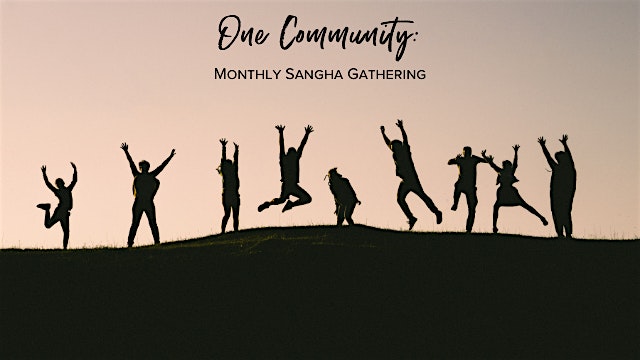Description
This month’s Sangha gathering: Tuesday, Nov. 22nd @ 5:30-7:00pm MST (click HERE to view in your time zone)
November Theme: Seeing Clearly. Justin Kirkwood will be joining us this month to teach about the theme of "seeing clearly." The Buddha described the path to enlightenment as one which liberates by seeing and described the root of all of our suffering to be ignorance. The Buddha said that this ignorance is an unawareness of reality. This evening we will discuss how to approach reality, how we gain an ever-clearer view of it through study, contemplation, and meditation and the difference in both clarity and power between knowing something intellectually and gaining direct realization of it.
One Community Gathering Description
Each month, we come together as a community to meditate, share, and connect around our practice. Each gathering is facilitated by a different Namchak peer, staff member, thought leader or teacher around the theme of the month. Sometimes our agenda closely follows our Learning Circle model, which includes check-ins, a Dharma talk or shared resources around the theme, journaling, small discussions in break-out rooms, full group discussions and group practice. The culture of this format encourages active participation, but participants always have the right to pass. Other times the format follows that of a formal dharma talk from a teacher, where a teaching is given followed by a Q&A session. This month will follow the format of a dharma talk. It will be recorded, so individual sangha members and Learning Circles can have continued access to these teachings.
Background for this month's teacher
Justin Kirkwood has been studying and practicing Buddhism for over twenty years and has been working as a Tibetan translator and interpreter for more than ten. He lived in India for eight years, studying and practicing with many great teachers and spent three of those years as a monk, studying Buddhist philosophy in a Tibetan monastic seminary. He now works at the Namchak Foundation as a translator of texts, as Namchak Khen Rinpoche’s interpreter, and as a meditation teacher.
Zoom Link
Zoom link will be provided upon registration. Please note: Confirmation emails from Eventbrite often end up in spam/promotions tab. Please check there if you do not see the confirmation email with the Zoom info.
Our Community Commitments
In order to co-create a brave, inclusive, anti-oppressive and learning centered space, in our community we each agree to:
- Be inclusive of diverse opinions and backgrounds through treating each other with respect and appreciation.
- Commit to words and actions of non-harm within our group interactions.
- Learn by immersing in these practices and giving them a real test drive.
- Hold personal sharing in confidence.
- Be present, practice mindful listening, and do not offer unsolicited advice.
- Allow and invite for equal sharing of voices as well as the right to pass.
- Take care not to speak for others in the group.
- Assume good intent and come from a place of curiosity and care.
- Come as we are with permission to be “raggedy.”
- Be mindful of and take personal and collective responsibility for our own biases including the use of language that may “other,” “cancel,” or dehumanize any person, groups of people, and/or their experiences.
- Perfection is not expected although personal and collective responsibility always is. Use the “Ouch/Oops” tool to address hurtful comments and language in the moment and to allow space for repair.*
We aspire for this sangha to be a place of refuge
*Ouch/Oops . This is a tool for addressing hurtful comments/language in the moment. If someone says something hurtful, anyone can bring attention to it in the moment by saying “Ouch” and then explaining what was hurtful. If it is a word choice issue, be sure to give the first speaker the chance to rephrase and try again (remember, it’s okay to be raggedy, and we are all assuming good intent!) When someone says something that comes out wrong or hurts someone else, they should start with “Oops” – first, acknowledge the impact of their words, and then try again. This can also be done outside of the event if someone feels an “Ouch,” but does not feel comfortable sharing it with the group at that time. We aspire for this sangha to be a place of refuge.

